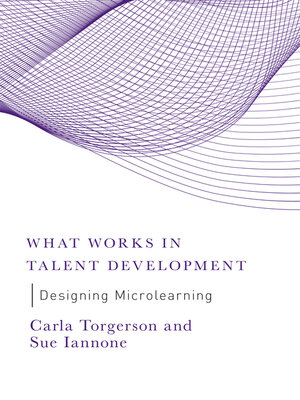
Sign up to save your library
With an OverDrive account, you can save your favorite libraries for at-a-glance information about availability. Find out more about OverDrive accounts.
Find this title in Libby, the library reading app by OverDrive.



Search for a digital library with this title
Title found at these libraries:
| Library Name | Distance |
|---|---|
| Loading... |
Learn to Create Effective Microlearning
Microlearning is an essential tool that talent development professionals can use to fully engage their learners and tackle organizational performance needs. How do you know if the microlearning approach is successful? And what works?
In Designing Microlearning, the newest volume in ATD's What Works in Talent Development series, experts Carla Torgerson and Sue Iannone answer these and other questions including:
Why choose microlearning for your learners and organization? How do you determine your approach and then execute the implementation? How do you demonstrate success? Where do you go once you've started?
This guide for practitioners covers the four main uses for microlearning: preparation before a learning event, follow-up to support a learning event, stand-alone training, and performance support. It introduces MILE, the MIcroLEarning Design model, which outlines the details of creating a microlearning resource or program. Discover how to identify performance objectives; determine program technology and structure; create or select resources; promote what you designed; and monitor, modify, and evaluate it.
Included are case studies, tips, and resources, as well as more than 20 job aids, checklists, and worksheets. Samples consist of:
an assessment of your organization's readiness and compatibility for microlearning a worksheet to guide the design of your microlearning a tool for aligning your microlearning measurement and evaluation efforts a communication plan for sharing key information with learners, managers, and stakeholders.
Microlearning is an essential tool that talent development professionals can use to fully engage their learners and tackle organizational performance needs. How do you know if the microlearning approach is successful? And what works?
In Designing Microlearning, the newest volume in ATD's What Works in Talent Development series, experts Carla Torgerson and Sue Iannone answer these and other questions including:
This guide for practitioners covers the four main uses for microlearning: preparation before a learning event, follow-up to support a learning event, stand-alone training, and performance support. It introduces MILE, the MIcroLEarning Design model, which outlines the details of creating a microlearning resource or program. Discover how to identify performance objectives; determine program technology and structure; create or select resources; promote what you designed; and monitor, modify, and evaluate it.
Included are case studies, tips, and resources, as well as more than 20 job aids, checklists, and worksheets. Samples consist of:







